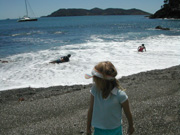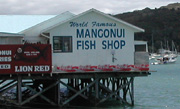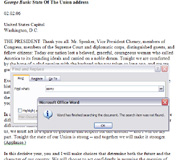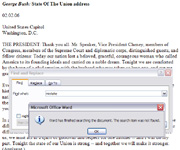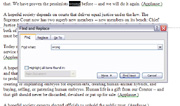Four weeks into the New Year I'm quite taken by the colorful character of the minor criminals so far. I especially liked the Micky and Mallory pair of teenage sweethearts who left a Hansel and Gretel trail of trashed motel rooms and swindled Shell stations behind them as they blazed a trail of summer glory across the North Island propelled by corn chips, two-litre cokes and, presumably, young lust. I'm assuming lust on the basis of the last line of the Herald report which conjures so much in a single sentence: The owner found the room covered in red candle wax. Thanks for the entertainment, Amber and Nick. Sucks to be you on 24 hour curfew, though. Mudvayne fuckin' rocked out.
I also like the notion of a burglar who can no longer hold his head up in criminal company because he got hog-tied by a few OAPs in Christchurch. Do burglars have their own magazine yet? There's hardly a niche that isn't covered these days. If they do, you'd want to see this guy on the cover of the next issue, wouldn't you?
I'd also want to see an interview with the Einsteins in Mission Bay who wore balaclavas to kidnap their mate for his stag party 'surprise'. It's not street theatre if people just scream, dude.
Best of all, though, my favourite minor criminal of the month is Mr George Bernard Shaw, who had to face the wrath of the people this week for hiring a couple of goons to carry out a drive-by tree hit. Early last year, two goons came screaming to a halt outside Mr G B Shaw's development site, leapt from the car brandishing chainsaws, and proceeded to drop a protected Pohutukawa tree in ten frenzied minutes, then fled the scene.
"No idea how that happened" said George when the cameras arrived on his doorstep. He was shocked, shocked! Oh, and gutted. Although he had three previous convictions for dropping protected trees, he kept up his steadfast denials until the city council wheeled out a fairly big barrow of evidence that suggested he might be telling porkies. He then changed his tune and fessed up.
If a protected tree falls on a developer does anyone make a sound? The sentencing of Mr Shaw has turned into quite an elaborate entertainment. The judge thought a restorative justice session before sentencing might be useful, not least because it might shed some light on the profundity of the defendant's contrition, what with the three priors for the same offence and all.
And so it came to pass that we got a front page picture in yesterday's Herald of Mr Shaw sitting on his own at the front row of a gathering in Onehunga with several dozen residents in serried ranks behind him, several of them with tight arms folded firmly across their chest in best rugby team photo fashion. George meanwhile clutched something in his fist quite tightly, making it a little tricky to discern what it might be. A hanky, perhaps? He looked a little perturbed. Or were the tear-pricked eyes just a show for the cameras, and was that actually an oily chainsaw rag?
Elsewhere in blog-land, the more fervent wingers took issue with poor Mr Shaw's treatment, for a variety of reasons. Farrar, for example, mocked the girly-man nature of a meeting that might seek to establish how people felt about the death of "poor Johnny Pohutukawa". Mock all you like, buddy, but I got the distinct feeling from the coverage of the meeting that the vehemence of the feelings expressed was not lost on the defendant. It should also be plain to Mr Kiwiblog from watching the energy with which commentors on his site go to their work that there is some therapy and catharsis to be enjoyed in fulminating as loud and long you can about people that irk you. Of course you have to be a bit braver to do it in the same room as the person involved.
The most ruggedly individualist of the commentors spluttered about the abrogation of the my treehouse is my castle principle. Well, put me on the side with the tree huggers. We protect trees because by common consent, we have established that cities tend to look nicer with them than without them. Given that it can take more than half a dozen cycles of property boom and bust for some trees to grow to maturity, they need to be protected from the whims of people whose sole preoccupation is to make a nice profit on their little chunk of the city, and bugger the civic amenity.
We undoubtedly live in age where individualism and self-interest prevail, but it does leave you breathless sometimes to see how rabidly that principle is asserted without consideration for the benefits that have been and continue to be delivered to individuals by the common understanding that the community interest - the greater good - can sometimes deliver a superior outcome for everyone. I can find libertarian arguments by bloggers like, say, Peter Creswell, quite compelling, but I doubt that even he would assert - as some of the more rabid commentors seem inclined to do - that there's never a circumstance in which community interest should trump that of the individual.
Which brings me to the other more celebrated George Bernard Shaw, whose politics were altogether more tilted towards the collective. I don't know if the two are related, but if so, Shaw the developer might have considered the words of Shaw the forebear who offered the prescient thought that Criminals do not die by the hands of the law. They die by the hands of other men.
'Die' might be putting it a bit strong, but poor Mr Shaw didn't appear to be having much fun at the hands of his neighbours. You couldn't say the same of his namesake, who had a thoroughly splendid time at various public meetings here in New Zealand in 1934, if the newspaper reports are accurate.
Let us turn to the front page of the Evening Post, and its Black Friday edition of April 13 1934. Why look: it begins with the reporter's question that precedes all others: What do you think of New Zealand? "New Zealanders seldom have the opportunity of hearing a frank opinion of themselves and their institutions," it begins.
Distinguished visitors from time to time have told us that we are too self-satisfied but they have left it at that. Last night, Mr G. Bernard Shaw…went a great deal further. Making no secret of the fact that he is a Communist, Mr Shaw made full use of the waiving of Government regulations in his favour, and freely criticised existing institutions.
Waiving of Government regulations! Now there's a Friendly Road story right there. Promise to come back and explore that particular slice of history in a future blog. But back to Comrade Shaw.
He found definite signs of Communism in the Dominion, and concluded by describing New Zealand as "second only to Russia." Yes for the generation who've grown up buying the crock that Ronald Reagan brought the Evil Empire to its knees, you might be surprised to learn that in the aftermath of the Great Depression, the western world was looking over the fence at flourishing Russia, and wondering if there might be a lesson to learn from the Reds.
Oh but Mr Shaw was an entertainer, if perhaps a little on the egotistical side:
I understand that I am being overheard by a neighbouring continent called Australia. I have nothing to say to Australia at present except to give them the pleasure of listening to me. But I have a few things to say to New Zealand. You understand that I am going away almost immediately after this, and you must console yourselves as best you can for the ensuing dullness of the islands.
Uh oh. Dullness? There's more: Mr Shaw said he was not altogether satisfied with New Zealand.
To begin with you have a large number of unemployed. That is absolutely a nonsensical state of affairs. There is plenty of employment everywhere in New Zealand. When I went to Christchurch the other day, I came across an unfinished railway - a main trunk line. You ought to finish that line. You will have to finish it some day. I understand you made a start on it and then got cold feet because somebody said it wouldn't pay. You needn't trouble about that. You may leave that for private companies who will do that for profit. All the things the New Zealand government, representing the New Zealand people, has got to do wouldn't be done for profit at all. You wouldn't expect it to pay. You don't expect your roads and bridges to pay directly and yet you would be much poorer without them.
It would be nice to have him back here (and from the dead, of course) to catch up on ideological developments, don't you think?
Let's get on to the real Commie stuff. The distribution of wealth, was too unequal, he said, but that wasn't the whole of it. We should also be distributing our leisure: "I don't think there is an excuse for anybody having to work for more than four hours a day."
At present, he said, they gave leisure to a certain number of idle (rich) people who did not do anything at all and were extremely miserable. "You can't expect me to regard you as sensible Islanders when you do that. It is perfectly scandalous and I hope before I see you again, you will remedy that."
And on he went: nationalising land, he thought, would be problematic, which had largely to do with the fact that there were "certain men, perhaps 5 per cent of the community, who were willing to devote their whole lives to the making of money by making other people work for them." They had "a certain managerial ability", while the typical modern working man was "more or less helpless."
Then he was on to tariffs and free trade, and finally to the matter of a remarkable thing he had seen in Wellington.
You have in Wellington a remarkable milk supply which is the envy of the whole world. I believe an intelligent town like Nuremberg in Germany has copied the whole scheme from you.
Thanks to Sir Truby King, a man of great ability who probably would never have been a success as a popular politician, you have an infant mortality rate less than half that of England. You have this municipal milk supply, with Sir Truby King looking after what is done with the milk for the babies. But your milk, I think, costs too much.
I just want to ask: why not distribute it freely? This is very important in New Zealand. A little loss on milk doesn't matter. It is of enormous importance that all your children should be a generation reared from first class children. When you have done this, when you have distributed free milk, which is just as possible as free water, I would then suggest that you should go on from free milk to free bread. If you have free bread, and anybody can go to a store and get it, such a thing as a hungry child will be impossible in New Zealand.
And having well and truly got the socialist blood pumping he declared that New Zealand was leading all the world but Russia in Communism even though it didn't know that it was Communist, and had no taste for the ideology.
It actually thinks that Communism is a very terrible thing. I am a Communist. I studied Karl Marx fourteen years before Lenin did. You see, I am a very sensible and well-meaning person. I am sure that when I go away you will regret me very much and you will be sorry that I can't give you a few more talks. Goodnight everybody.
So we know what he thought of New Zealand. What did New Zealand think of Mr. Shaw? The report tells us that a number of the gathering were thrilled:
It is the best twenty minutes I have spent in this council chamber said Councillor P Fraser MP, when some of the problems skated over with superb certainty by Mr. Shaw came forward again in wearisome but necessary detail.
The Mainstream Media in 1934 were nothing if not fair and balanced, and so elsewhere on the front page we discover there was a more muted response from other quarters, and perhaps none more so than from the Chairman of the Auckland Metropolitan Milk Association who declared:
I am certainly disappointed in the views of some philosophers who have recently been visiting New Zealand.
